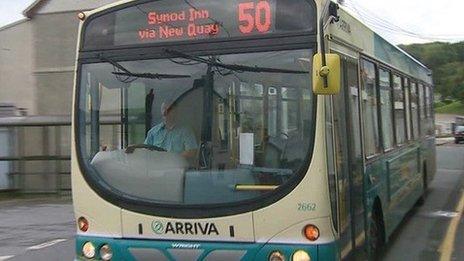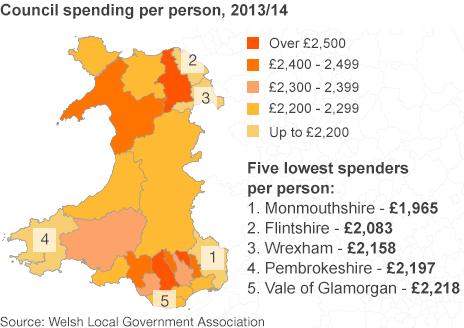Viewpoint: Councils must think long-term to survive
- Published
The agony of Welsh local authorities in setting their budgets for this year has been palpable.
This is the first year in which cuts under the UK government's austerity plans have so impacted on local government in Wales, but the signs are that it won't be the last.
The economy may be recovering but it looks as though we may still only be in the early stages of a continuing drought in the flow of public spending on services.
Councils are already on notice that their Welsh government revenue grant, cut more deeply in the last budget, will be cut again for next year.
But it is unlikely to stop there. Although their visions are very different, both George Osborne and Ed Balls are signalling a continued squeeze on day-to-day public spending in the next parliament.

Parents in Rhondda Cynon Taf protested about cuts to nursery services
The Wales Public Services 2025 Programme, external is warning that pressures on public spending and rising demand for services, of which our ageing population is only one, could mean that the funding gap for public services in Wales reaches £2.6bn or more by 2025 unless policies change.
This year, most councils have been seeking to handle the cuts in broadly conventional ways - such as cuts to services and grants, rationalising buildings and property, increasing charges and raising council tax.
Schools and social services, as well as tackling poverty programmes, are generally being protected from the full effects - the statutory obligations are more defined and Welsh government direction is strong.
In general, the services which seem to be bearing the brunt include leisure, libraries, culture, public transport, highways, street cleaning services, local facilities and projects.
But these are the very activities which are important to councils in shaping and developing their locality.
Continued year-on-year cuts would surely risk terminal damage and even raise the whole question of why have local government at all.
Local government has to find another way of delivering for their communities with fewer staff and less money.

More than 2,000 people joined a campaign to stop the closure of Plas Madoc Leisure Centre in Wrexham
Local government has to find another way of delivering for their communities with fewer staff and less money.
National schemes on procurement, regional collaborations and developments such as City Regions are important but will not be enough. Local authorities have to think long-term and thinking radically.
Some councils in Wales are recognising this. Two main threads are emerging.
The first is rethinking their relationship with the people they serve.
This means shifting from a traditional top-down approach to service delivery to one based on services working actively with individuals, families or communities, drawing on their experience and skills in finding ways forward rather than people being passive recipients.
The language is increasingly about self-directed care, peer support, taking preventative action early, local co-ordination to join up health, social and other services around the needs of the individual, and community assets run by social enterprises or local groups.
There are limits to this - for example where it requires prompt action - but the results can be both better and potentially less costly.
One council quotes the story of an older person who simply needed a weekly lift to a local centre rather than a bevy of professionals visiting her.

Council across Wales have reduced subsidised bus services over the past three years to save money
The second is that this requires councils to change the whole way they work, their culture and their systems.
They will have to work in new ways with the third and private sectors as well as their communities.
In England, many councils are moving towards this more "enabling" role and there are developments to watch such as the "co-operative councils" network.
Councils will need to look and feel very different in 10 years time but it is important to recognise that none of this is easy; it is not a quick fix and needs careful planning.
This is why the question of local government re-organisation in Wales needs to be settled as quickly as possible and a clear vision for local services established.
And the public has to be brought into this discussion soon.
